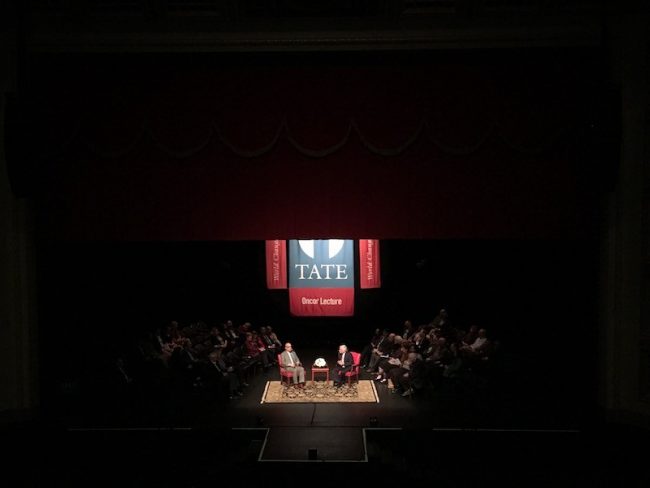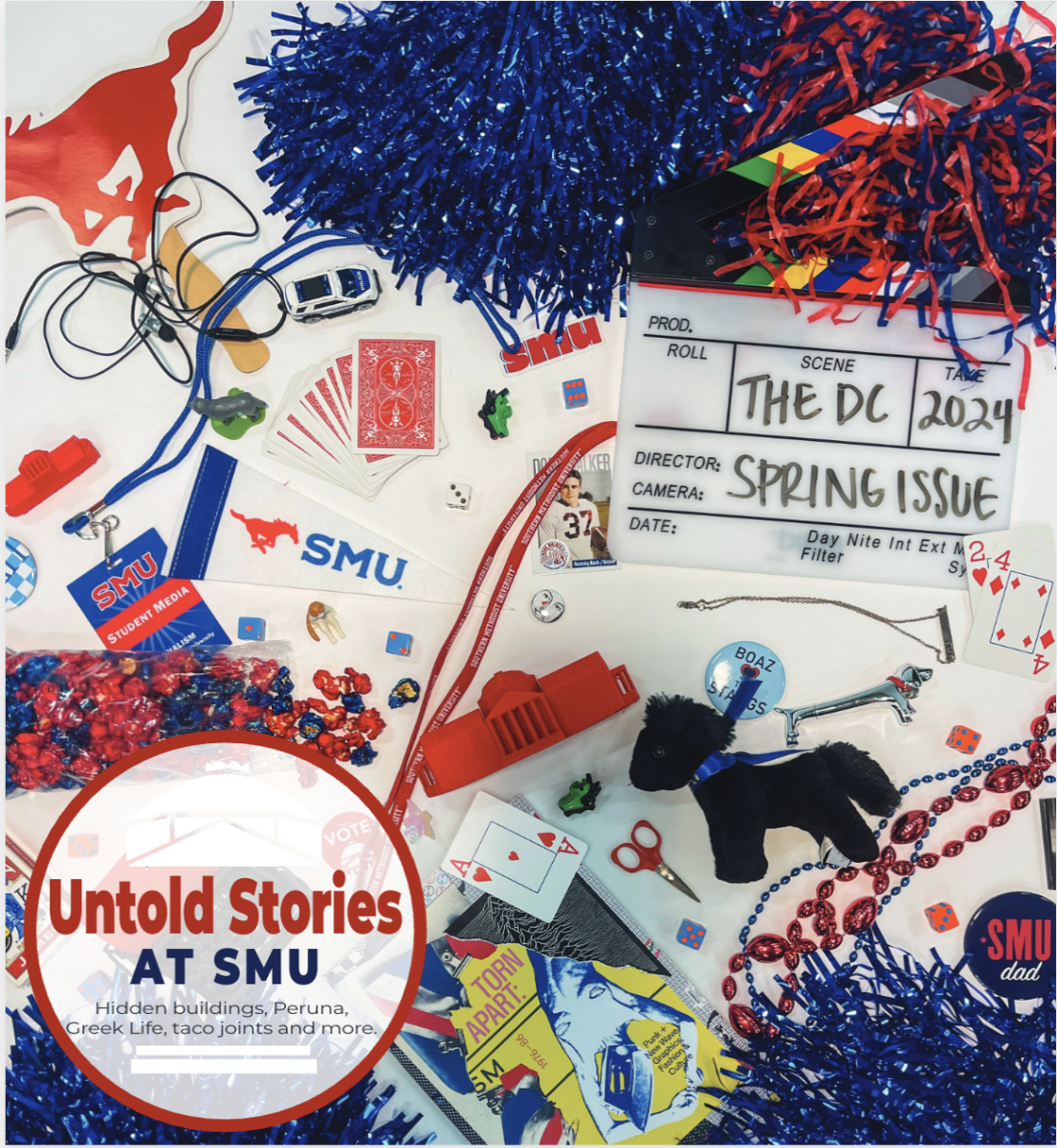“Welcome home to Texas!” said Walter Isaacson, president, and CEO of the Aspen Institute, to Ford Foundation president Darren Walker. The Ford Foundation has an endowment of over $12 billion.
On Feb. 27, Walker and Isaacson discussed social inequality, gratitude, and philanthropy during the Oncore Lecture of the 2018 Tate Lecture Series.
“My life has been characterized by enormous generosity… supported by philanthropy,” Walker said. “I got to attend the University of Texas on a very important scholarship that was made possible by a philanthropist, and by a great amount of luck.”
The “beginning of modern American philanthropy… [was the] 1890s,” Isaacson said.
“It’s important to remember that all these names today are the gold standard. But, Carnegie and Rockefeller were profoundly reviled in society,” Walker said. “John D. Rockefeller was so hated that he could not get a charter to establish the Rockefeller Foundation because Congress was so suspicious of anything he might wish to do with his wealth that they, for three years, turned down his lawyer’s request to establish the Rockefeller Foundation. But he believed deeply in the idea of giving back.”
However, America and philanthropy have both come a long way since America’s modern beginnings at the end of the 19th century.
“For this century’s philanthropists,” Walker said. “The Gospel of Wealth has to be informed, not by generosity, but by justice.”
Walker recalled a Martin Luther King Jr. quote: “Philanthropy is commendable, but it shouldn’t allow the philanthropist to ignore the very injustices that make philanthropy necessary.”
“What he was saying maybe was that the wealth of Rockefeller and Carnegie came at the expense of the lives and livelihoods of millions of people,” Walker said. “In gaining their wealth, injustice happened in America. And it’s not enough to simply say that because that happened, I now should give money away to charity. We should interrogate why injustice exists.”
“Most people simply want to live lives characterized by dignity… and we have far too many people living without dignity, and so we have to interrogate what the systems that produce lives that are lived without dignity,” Walker said.
“Getting at the root cause is what will allow us to solve these injustices, which, for some of us, can make us really uncomfortable, because it makes us interrogate our own privilege and it makes us interrogate the very systems that produce our privilege in our culture,” Walker said.
Isaacson expanded on racism’s large role in injustice seen in America today.
“To what extent is racism a part of this systemic cause?” Isaacson said.
“There is no doubt that our country is constrained by a history of racism,” Walker said. “I believe that is really what is most exceptional about our country is our ability to work to overcome our history.”
“I believe in honesty and candor,” Walker said. “Because only through that can we get to the other side of these challenges.”
Looking candidly at the American criminal justice system is just one challenge.
“When we look at the history of how our current modern justice system was constructed, it was constructed around race,” Walker said.
“It’s well documented that the war on drugs was an effort by the Nixon administration to delegitimize the two communities who the administration felt were the enemies: hippies and negroes, according to the transcript… It wasn’t that in 1972 America had a rampant drug problem because we didn’t. But it was created to criminalize entire communities of Americans,” Walker said.
“Sadly, every administration after the Nixon administration, both Democrat and Republican, did everything they could to pile on. The good news is that this isn’t a partisan issue anymore,” Walker said.
Progress on changing the criminal justice system is underway.
Detroit, a city undergoing change, though not without its lessons, is a city where Walker was instrumental in this change.
“Detroit is a very interesting story that, going back to the issue of race, just because you elect a black mayor doesn’t mean he’s going to be a better mayor,” Walker said. “And so, look at what’s happened in Detroit.”
“They elected a white mayor,” Isaacson replied.
“Yes! Because he was the best person to run that city… Detroit has learned the lesson of insularity. You have to work in the larger context,” Walker said.
“One of the odd things that happened in Detroit was, when bankruptcy came along, they said one way to get out of bankruptcy is to sell the great art in the museum. And then you stepped in,” Isaacson said.
“You can’t have a great city without a great museum. The DIA [Detroit Institute of the Arts] is one of America’s great institutions. I was in Italy and went to a Caravaggio show, and the star of the Caravaggio show in Milan was the Caravaggio from the Detroit Institute of the Arts,” Walker said.
Walker said he learned to love art at a young age, mesmerized with art books that his grandmother used to bring to him.
“Art imbued a sense of empathy. I think empathy is a really important thing we need more of desperately in the world,” Walker said.
“When I watch a person who is different than me, a person that is white, male, straight, lives in the middle of America, talk about what he sees happening in the country, I really do listen,” Walker said. “I may not agree with the results of that. But to be able to understand why someone feels that way only comes through a deeper understanding and work. It comes from humanities and the arts.”
“I think about Roosevelt’s four freedoms… With the freedom of speech comes a responsibility to listen. In some ways we stopped listening because we became so convinced that we’re right,” Walker said.
However, there seems to be a lack of empathy in the world in which we live.
“It’s not that we’ve become less empathetic,” Walker said. “It’s that the growing sense of inequality in this country has hardened us, because it has made us feel more vulnerable, less secure, more anxious.”
Some of this anxiety and vulnerability is exacerbated by the negativity of our discourse.
“The polarization and the poison of our discourse seems worse these days,” Isaacson said.
“It’s worse these days because we have allowed our leaders to degrade our discourse,” Walker replied. “We have been participants in, or maybe just bystanders in, a body politic that seeks to demonize those with whom we disagree.”
“I don’t believe that that’s helpful to building the fabric that we need,” Walker said.
“Now, I can feel that way because I’m pretty secure. I can take the high road. If you’re a working-class person who is feeling truly worried about your economic situation, you’re not likely to take the high road…[and] you’re certainly not likely to take the high road if your leaders are saying your situation is the fault of some other group of Americans,” Walker said.
But our leaders aren’t the only party to blame.
“The media has contributed to the damnation of the discourse,” Walker said.
“This underpinning of our democracy—information, news, quality—we lose that because the market says that doesn’t matter,” Walker said. “There are more people who are interested in watching Jerry Springer than the news… But [quality news and information] does matter to our democracy.”
Isaacson and Walker both agreed that social media is also contributing to the illegitimacy of our information.
“Tim Berners-Lee, who invented the World Wide Web, is on our board, and he and I have had many conversations about what he envisioned when he created the Web,” Walker said. “And his idea was to democratize information and to create a platform where communities could be built around which positive things have happened. When I last spoke to Tim about this, he was devastated. He would never have imagined that a foreign government would seek to destabilize our democracy through social media. That was never a part of the plan.”
While toxicity has seeped into public information, Isaacson and Walker talked about how toxicity has also seeped into a word: the word “public.”
“Things with the nomenclature of ‘public’ have also been degraded,” Walker said. “The things that have been the underpinning of our democracy—public education, public parks, public housing—you put public in front of it and it implies that we have given up on it.”
“I think about the words of Justice Brandeis,” Walker said. “He said, ‘America can have a democracy or America can have a country where the wealth is owned by a few. But you can’t have both’ …because when that happens, there is less investment in the public square. There is less investment in public infrastructure and we allow things to atrophy,” explained Walker.
“And I don’t think we can give up on the public square. Because if we give up on the public square, we’re giving up on our democracy,” Walker said.
So, there’s injustice. Our media has gone sour. What can we do as individuals?
“I think if we, one by one…think about extending ourselves and our privilege in a way that doesn’t just make our situation better, and we ask, when we see injustice, do we have to have this? How do we eradicate this?” Walker said.
But privilege in itself is a special thing.
“I’ve lived with privilege and I’ve lived without privilege, and it’s really good to live with privilege,” Walker said.
And, for those of us who do have privilege, we shouldn’t be ashamed of it.
“I think to live with gratitude every day does allow you to live a fuller life,” Walker said.
“It’s one of the things I worry about right now in our own country and in the world,” Walker said. “I’m worried that we are not perceived in the world as a nation of people with gratitude and that we would be perceived in a world as not standing for the things that America has always stood for.”
Why is this so important though? Why do we care how the outside world views us?
“America will not be successful if we cannot contribute to a more successful world,” Walker said.















